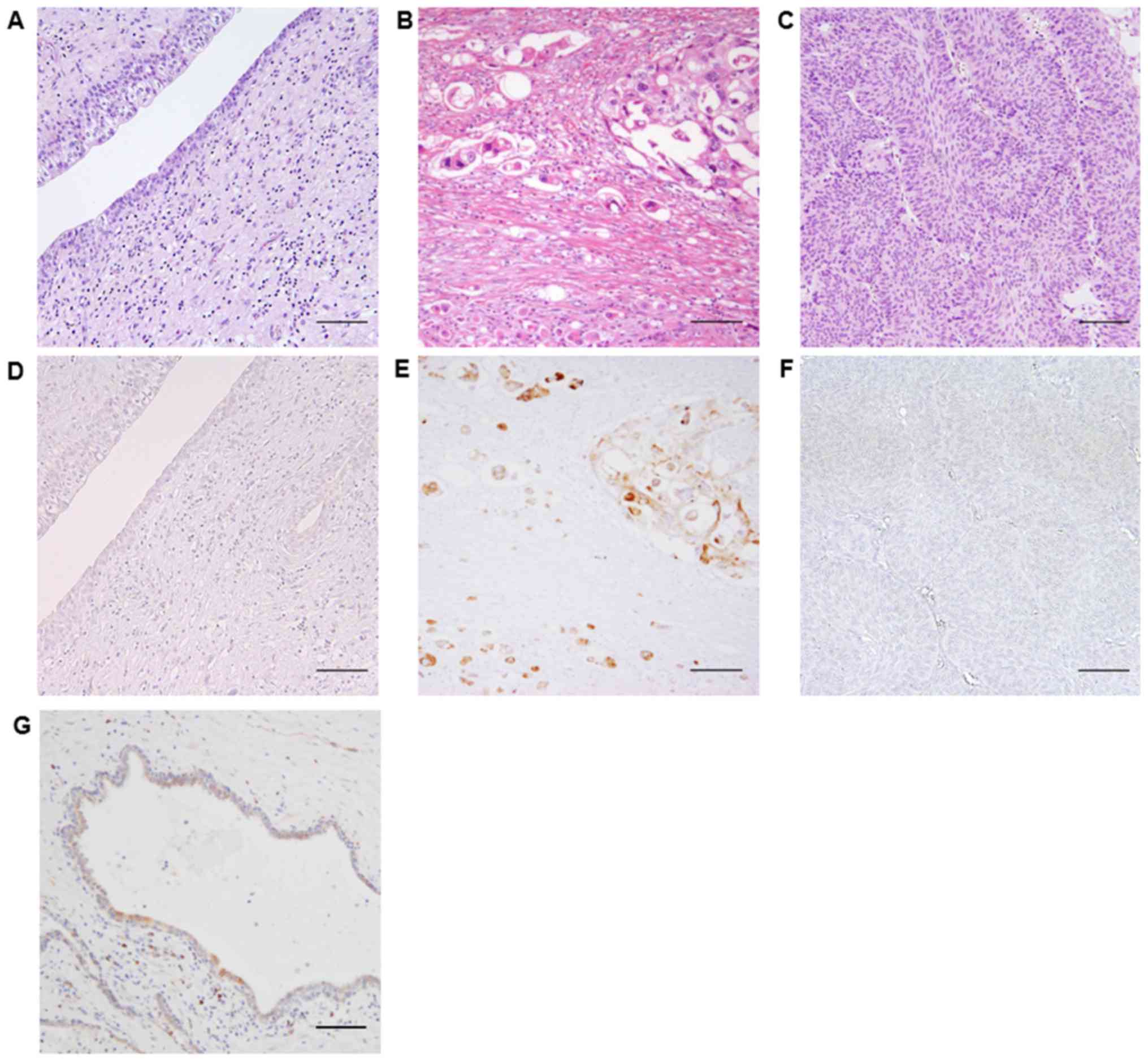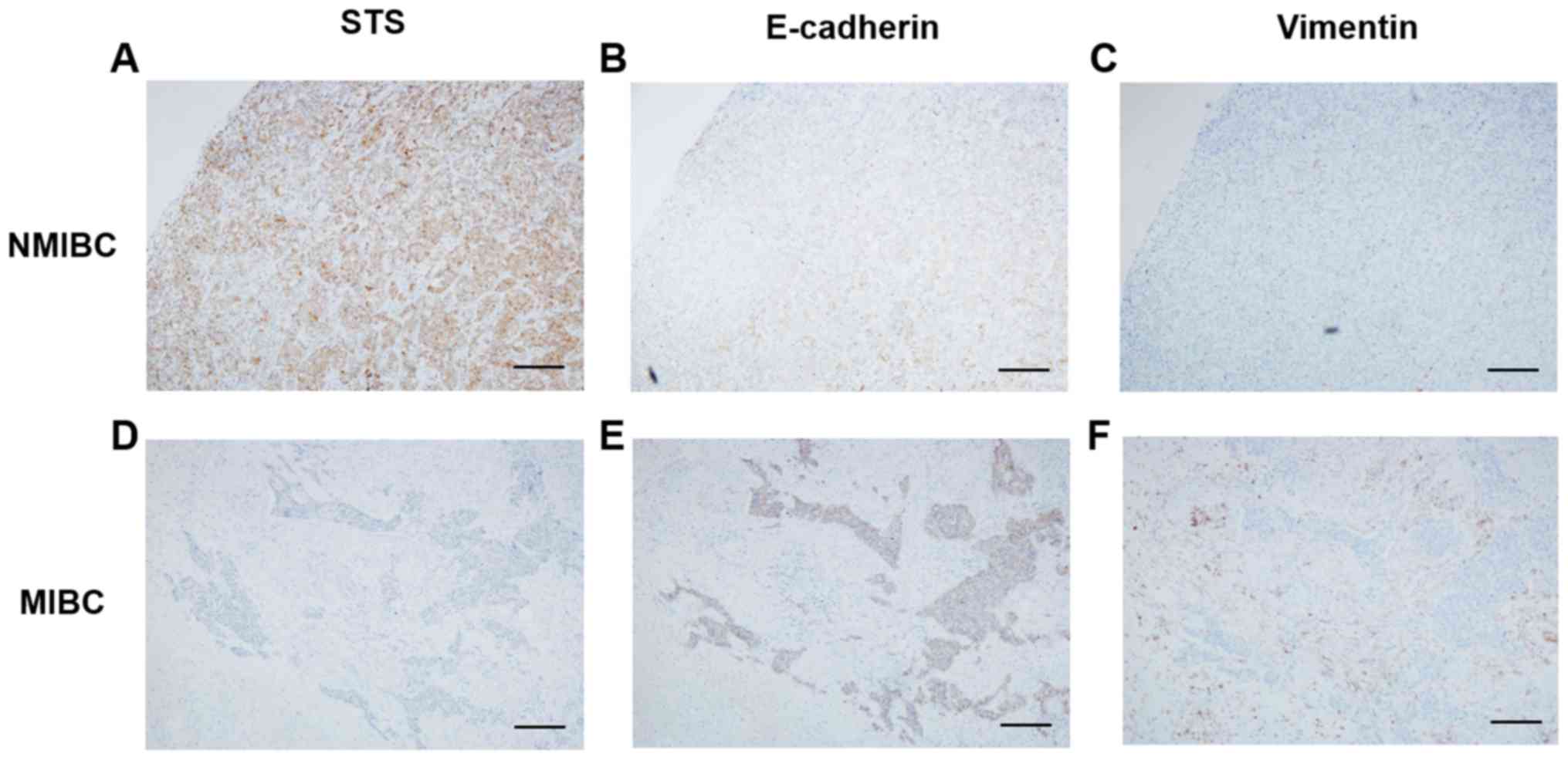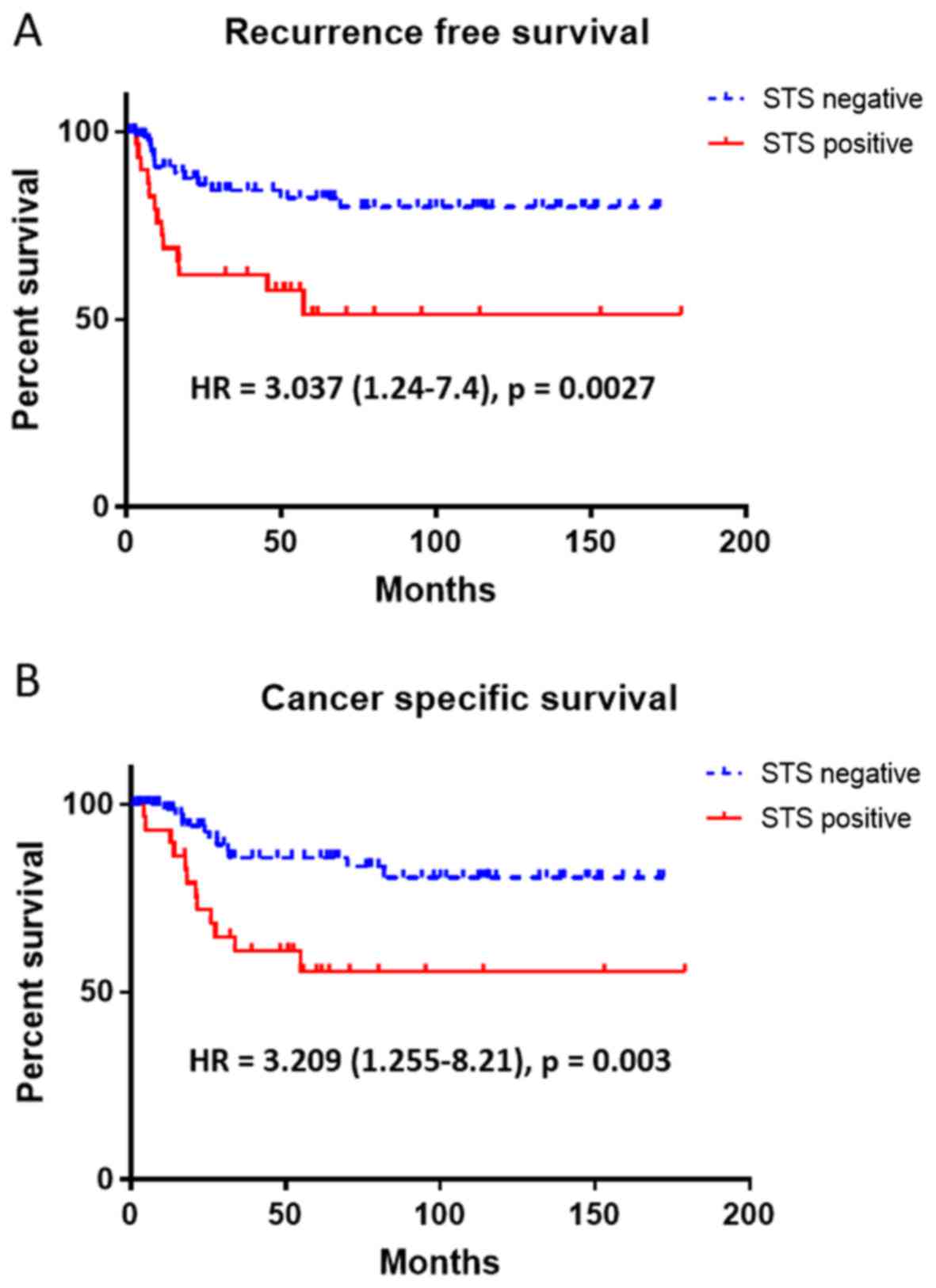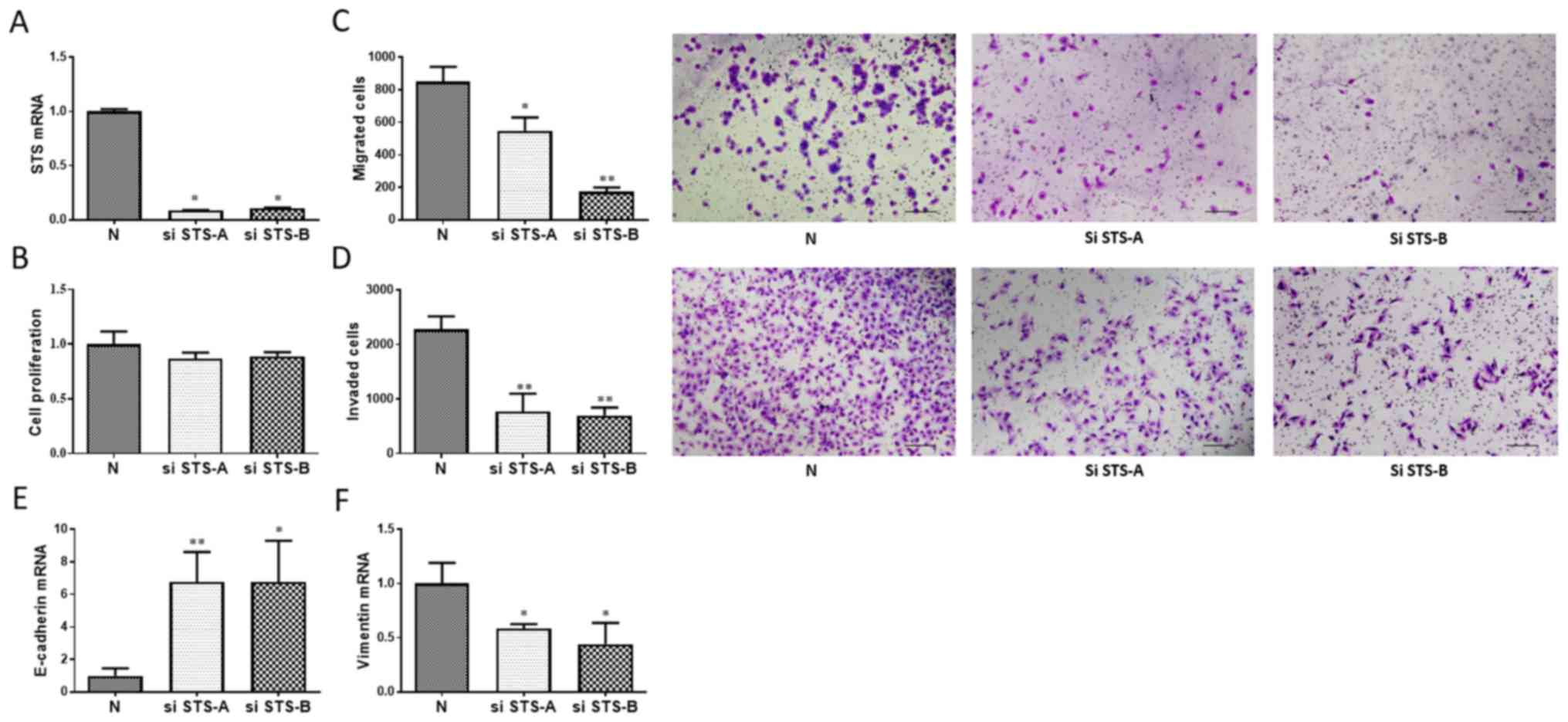|
1
|
Siegel R, Ward E, Brawley O and Jemal A:
Cancer statistics, 2011: The impact of eliminating socioeconomic
and racial disparities on premature cancer deaths. CA Cancer J
Clin. 61:212–236. 2011. View Article : Google Scholar : PubMed/NCBI
|
|
2
|
Hartge P, Harvey EB, Linehan WM, Silverman
DT, Sullivan JW, Hoover RN and Fraumeni JF Jr: Unexplained excess
risk of bladder cancer in men. J Natl Cancer Inst. 82:1636–1640.
1990. View Article : Google Scholar : PubMed/NCBI
|
|
3
|
Hemelt M, Yamamoto H, Cheng KK and Zeegers
MP: The effect of smoking on the male excess of bladder cancer: A
meta-analysis and geographical analyses. Int J Cancer. 124:412–419.
2009. View Article : Google Scholar : PubMed/NCBI
|
|
4
|
Kato M, Wei M, Yamano S, Kakehashi A,
Tamada S, Nakatani T and Wanibuchi H: DDX39 acts as a suppressor of
invasion for bladder cancer. Cancer Sci. 103:1363–1369. 2012.
View Article : Google Scholar : PubMed/NCBI
|
|
5
|
Imada S, Akaza H, Ami Y, Koiso K, Ideyama
Y and Takenaka T: Promoting effects and mechanisms of action of
androgen in bladder carcinogenesis in male rats. Eur Urol.
31:360–364. 1997. View Article : Google Scholar : PubMed/NCBI
|
|
6
|
Miyamoto H, Yang Z, Chen YT, Ishiguro H,
Uemura H, Kubota Y, Nagashima Y, Chang YJ, Hu YC, Tsai MY, et al:
Promotion of bladder cancer development and progression by androgen
receptor signals. J Natl Cancer Inst. 99:558–568. 2007. View Article : Google Scholar : PubMed/NCBI
|
|
7
|
Shiota M, Takeuchi A, Yokomizo A,
Kashiwagi E, Tatsugami K, Kuroiwa K and Naito S: Androgen receptor
signaling regulates cell growth and vulnerability to doxorubicin in
bladder cancer. J Urol. 188:276–286. 2012. View Article : Google Scholar : PubMed/NCBI
|
|
8
|
Mir C, Shariat SF, van der Kwast TH,
Ashfaq R, Lotan Y, Evans A, Skeldon S, Hanna S, Vajpeyi R, Kuk C,
et al: Loss of androgen receptor expression is not associated with
pathological stage, grade, gender or outcome in bladder cancer: A
large multi-institutional study. BJU Int. 108:24–30. 2011.
View Article : Google Scholar : PubMed/NCBI
|
|
9
|
Johnson AM, O'Connell MJ, Miyamoto H,
Huang J, Yao JL, Messing EM and Reeder JE: Androgenic dependence of
exophytic tumor growth in a transgenic mouse model of bladder
cancer: A role for thrombospondin-1. BMC Urol. 8:72008. View Article : Google Scholar : PubMed/NCBI
|
|
10
|
Rainey WE, Carr BR, Sasano H, Suzuki T and
Mason JI: Dissecting human adrenal androgen production. Trends
Endocrinol Metab. 13:234–239. 2002. View Article : Google Scholar : PubMed/NCBI
|
|
11
|
Selcer KW, Kabler H, Sarap J, Xiao Z and
Li PK: Inhibition of steryl sulfatase activity in LNCaP human
prostate cancer cells. Steroids. 67:821–826. 2002. View Article : Google Scholar : PubMed/NCBI
|
|
12
|
Purohit A and Foster PA: Steroid sulfatase
inhibitors for estrogen- and androgen-dependent cancers. J
Endocrinol. 212:99–110. 2012. View Article : Google Scholar : PubMed/NCBI
|
|
13
|
Nakamura Y, Suzuki T, Fukuda T, Ito A,
Endo M, Moriya T, Arai Y and Sasano H: Steroid sulfatase and
estrogen sulfotransferase in human prostate cancer. Prostate.
66:1005–1012. 2006. View Article : Google Scholar : PubMed/NCBI
|
|
14
|
Sobin LH and Compton CC: TNM seventh
edition: What's new, what's changed: Communication from the
International Union Against Cancer and the American Joint Committee
on Cancer. Cancer. 116:5336–5339. 2010. View Article : Google Scholar : PubMed/NCBI
|
|
15
|
Montironi R and Lopez-Beltran A: The 2004
WHO classification of bladder tumors: A summary and commentary. Int
J Surg Pathol. 13:143–153. 2005. View Article : Google Scholar : PubMed/NCBI
|
|
16
|
Tachibana H, Gi M, Kato M, Yamano S,
Fujioka M, Kakehashi A, Hirayama Y, Koyama Y, Tamada S, Nakatani T
and Wanibuchi H: Carbonic anhydrase 2 is a novel
invasion-associated factor in urinary bladder cancers. Cancer Sci.
108:331–337. 2017. View Article : Google Scholar : PubMed/NCBI
|
|
17
|
Lee WM, Jang KS, Bae J and Koh AR: The
role of steroid sulfatase as a prognostic factor in patients with
endometrial cancer. Yonsei Med J. 57:754–760. 2016. View Article : Google Scholar : PubMed/NCBI
|
|
18
|
Gravdal K, Halvorsen OJ, Haukaas SA and
Akslen L: A switch from E-cadherin to N-cadherin expression
indicates epithelial to mesenchymal transition and is of strong and
independent importance for the progress of prostate cancer. Clin
Cancer Res. 13:7003–7011. 2007. View Article : Google Scholar : PubMed/NCBI
|
|
19
|
Zhang Q, Helfand BT, Jang TL, Zhu LJ, Chen
L, Yang XJ, Kozlowski J, Smith N, Kundu SD, Yang G, et al: Nuclear
factor-kappaB-mediated transforming growth factor-beta-induced
expression of vimentin is an independent predictor of biochemical
recurrence after radical prostatectomy. Clin Cancer Res.
15:3557–3567. 2009. View Article : Google Scholar : PubMed/NCBI
|
|
20
|
Livak KJ and Schmittgen TD: Analysis of
relative gene expression data using real-time quantitative PCR and
the 2(-Delta Delta C(T)) method. Methods. 25:402–408. 2001.
View Article : Google Scholar : PubMed/NCBI
|
|
21
|
Mendez MG, Kojima S and Goldman RD:
Vimentin induces changes in cell shape, motility, and adhesion
during the epithelial to mesenchymal transition. FASEB J.
24:1838–1851. 2010. View Article : Google Scholar : PubMed/NCBI
|
|
22
|
Sánchez-Tilló E, Lázaro A, Torrent R,
Cuatrecasas M, Vaquero EC, Castells A, Engel P and Postigo A: ZEB1
represses E-cadherin and induces an EMT by recruiting the SWI/SNF
chromatin-remodeling protein BRG1. Oncogene. 29:3490–3500. 2010.
View Article : Google Scholar : PubMed/NCBI
|
|
23
|
McConkey DJ, Choi W, Marquis L, Martin F,
Williams MB, Shah J, Svatek R, Das A, Adam L, Kamat A, et al: Role
of epithelial-to-mesenchymal transition (EMT) in drug sensitivity
and metastasis in bladder cancer. Cancer Metastasis Rev.
28:335–344. 2009. View Article : Google Scholar : PubMed/NCBI
|
|
24
|
Suh BY, Jung JJ, Park N, Seong CH, Im HJ,
Kwon Y, Kim D and Chun YJ: Induction of steroid sulfatase
expression by tumor necrosis factor-α through phosphatidylinositol
3-kinase/Akt signaling pathway in PC-3 human prostate cancer cells.
Exp Mol Med. 43:646–652. 2011. View Article : Google Scholar : PubMed/NCBI
|
|
25
|
Hughes PJ, Steinmeyer A, Chandraratna RA
and Brown G: 1alpha,25-dihydroxyvitamin D3 stimulates steroid
sulphatase activity in HL60 and NB4 acute myeloid leukaemia cell
lines by different receptor-mediated mechanisms. J Cell Biochem.
94:1175–1189. 2005. View Article : Google Scholar : PubMed/NCBI
|
|
26
|
Shin S, Im HJ, Kwon YJ, Ye DJ, Baek HS,
Kim D, Choi HK and Chun YJ: Human steroid sulfatase induces
Wnt/β-catenin signaling and epithelial-mesenchymal transition by
upregulating Twist1 and HIF-1α in human prostate and cervical
cancer cells. Oncotarget. 8:61604–61617. 2017. View Article : Google Scholar : PubMed/NCBI
|



















